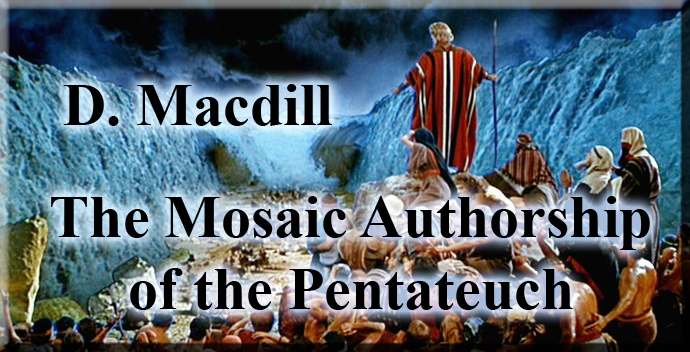
The Mosaic Authorship of the Pentateuch
By D. Macdill
Part III - Internal Evidence
Chapter 3
|
STYLE We have already dealt with the objection that the Pentateuch is written in different styles, and therefore could not have been written by Moses or any other single author. In reply, we showed that many authors have employed different styles at the same period of life, and that many an author has varied in style at different periods of life. The literary activity of Moses may have continued eighty years, or longer. Owing to his varied and wonderful experiences, the varied subjects of which he treated, and his surpassing and versatile talents, there need be no difficulty in believing that his style, both in thought and in diction, varied with his age and circumstances, mood and subject. Certainly, so far as style of language is concerned, he may have written the Pentateuch. He undoubtedly spoke and wrote the Hebrew language in its purity. The parting address,1 the Ninetieth Psalm, the song at the Red Sea, and other compositions that are expressly ascribed to him,2 are not failures in point of diction. We do not, however, forget that our critics deny that Moses is the author of any of these compositions. They indeed call attention to the fact that the Pentateuch nowhere calls itself by his name, and is not ascribed to him as its author; yet, in the case of compositions that are directly and expressly ascribed to him, they do not hesitate to declare the record false. But, after all, they admit that in the Pentateuch we have some genuine Mosaic productions — the book of the covenant, perhaps,3 or other groups of laws, though they claim that it cannot be certainly known what Moses did actually write; but, most assuredly, whatever he wrote w^as in pure Hebrew, like the rest of the Pentateuch. The fact that the critics have difficulty in deciding in their own minds what Moses wrote, indicates that the Hebrew of Moses and of the Mosaic age is the Hebrew of the Pentateuch. Possibly it is fear of being confronted with this troublesome fact that makes some of the critics so cautious about admitting that there is anything in the Pentateuch that Moses wrote. Driver does indeed venture to say that the song at the Red Sea is probably Mosaic; but Professor Cheyne, who is a faithful follower of the analysts, calls this declaration "a startling phenomenon," and "hesitates to contemplate the consequences which might possibly follow from the acceptance of this view."4 What this critic so much dreaded is the damage that might be done to the post-Mosaic theory of the analysts. They guard that theory more carefully than watch-dogs, and they recognize the fact that the admission of the decalogue, or of anything else contained in the Pentateuch, to be of Mosaic origin or of the Mosaic age involves conclusions in regard to the state of the Hebrew language of that period that conflict with their views. Arguing as they do about style, they must maintain that there was a marked change in the language during the time between Moses and Josiah, a period of more than eight hundred years. As their hypothesis is that Deuteronomy first appeared in Josiah' s time, and the four preceding books during the exile or after it, for the sake of their theory they feel constrained to maintain that Moses wrote nothing contained in the Pentateuch. They may admit that Moses originated some of the Pentateuchal laws, but they must insist that they were recodified and recast in post-Mosaic Hebrew. But after all the care and caution exercised by these critics, the argument from style may be turned against them. The first four books, according to their hypothesis, originated at a time when the Hebrew language had begun to take on Aramaic corruptions. Jeremiah's style is not purely Hebraic, though he was contemporary with King Josiah. One entire verse is in Aramaic.5 In Ezra and Daniel there are long Aramaic passages. There are Aramaic words and idioms in many other of the later books. They are found, or at least claimed, in Chronicles, Ecclesiastes, Canticles, Ruth, Proverbs, and later Psalms. Professor W. R. Smith says that such writers as the authors of Chronicles and Ecclesiastes use "Aramaic words and idioms which would have puzzled Moses and David."6 Now the question for these critics to answer is this: How is the fact to be accounted for that the Pentateuch is free from Aramaisms if Deuteronomy was written in the time of Josiah and Jeremiah and the other books were gotten up in the time of Ezra and Nehemiah? We have not very much confidence in these linguistic arguments, but it seems to us that these books must all have originated a good while before exilic times in order to escape Aramaisms which, to use Professor Smith's phrase, would have proved a puzzle to Moses as well as David. To be sure, according to the documentary hypothesis, E, J, and P may have lived and written early enough to retain the purity of the earlier Hebrew style, but how about the editors, revisers, and redactors who worked up the supposed ancient documents into the first four Pentateuchal books as we now have them? Why were no Aramaic peculiarities thrust into the text by these officious manipulators, who are supposed to have been the contemporaries of Ezra?
|
|
 |
 |
|
1) Deut. 32. 2) Ex. 17:14; 24:4. 3) Ex. 20:1-23:33. 4) Founders of Old Testament Criticism, p. 265. 5) Jer. 10:11. 6) Old Testament in the Jewish Church, p. 48.
|
|
-
Site Navigation
 Home
Home What's New
What's New Bible
Bible Photos
Photos Hiking
Hiking E-Books
E-Books Genealogy
Genealogy Profile
Free Plug-ins You May Need
Profile
Free Plug-ins You May Need
 Get Java
Get Java.png) Get Flash
Get Flash Get 7-Zip
Get 7-Zip Get Acrobat Reader
Get Acrobat Reader Get TheWORD
Get TheWORD